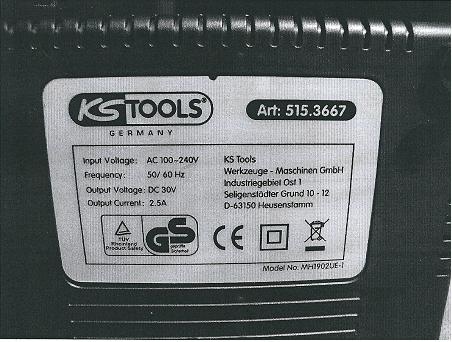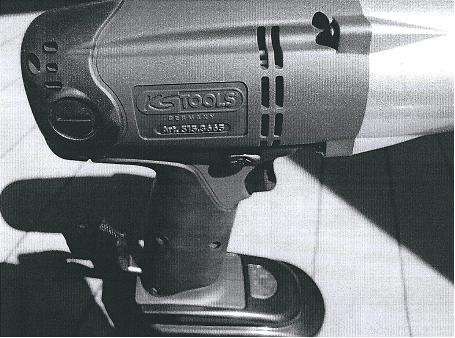Author: Thomas Seifried, trademark lawyer Europe and trademark lawyer Germany
Any questions?
Free initial assessment of your case
Attorney for trademark law Thomas Seifried has over 20 years of experience in trademark law and has also been a specialist attorney for intellectual property law ("Fachanwalt fuer gewerblichen Rechzsschutz") since 2007. He is an author of specialized books and has conducted many successful proceedings before courts and the trademark offices.
Contact us
Free initial assessment
Our initial consultation in trademark law is free of charge.
+49 69 9150760
Here you can send us your documents. We will treat your request strictly confidential.
Higher regional court of Frankfurt am Main, decision of 5.5.2011 – 6 U 41/10 – Akku-Schrauber
The case: The defendant sold cordless screwdrivers with the following type plate and the following inscription:


The cordless screwdriver was manufactured abroad.
The complaining competition association claimed that "Germany" was a geographical indication of origin. The "relevant public" would regard "Germany" as an indication of the origin of the cordless screwdriver and not of the manufacturer's location. The defendant was of the opposite opinion: "Germany" is here an indication of the location of the company responsible for the manufacture and not an indication of the origin of the cordless screwdriver.
The Regional Court of Frankfurt am Main ruled in favour of the Competition Association; the Higher Regional Court of Frankfurt confirmed the judgment: The term "Germany" is used here as a trademark (i.e. as a product designation) and not as a company designation (i.e. to identify the company). It is placed directly under the "ks tools" brand and therefore refers to the origin of the cordless screwdriver and not to the origin of the company responsible.
Consequences of wrong labelling with "Made in Germany": What sanctions threaten?
Anyone who incorrectly marks a product with "Germany" or "Made in Germany" runs the risk of receiving a warning letter from the competitors or from associations entitled to file an action (e.g. the "Wettbewerbszentrale Bad Homburg") with the request to submit a cease-and-desist declaration and of being sued for injunctive relief. Competition associations often act on indications from competitors. However, they also generate their income through flat-rate warning fees and contractual penalty claims and may also do so in principle according to the case law.
In addition to the prohibition, there is also the threat of claims for damages by competitors who are legally allowed to use the "Germany" label. Finally, the goods may also be confiscated during import, export or transit.
When is a product "Made in Germany"?
Decisions on "Made in Germany" are rare and inconsistent. In a quite recent decision of the OLG Düsseldorf (OLG Düsseldorf, judgement of 05.04.2011 - I-20 U 110/10, 20 U 110/10) it was a cutlery set that had been advertised with "Made in Germany". In concrete terms, the product packaging was marked "Produced in Germany" next to a black-red-gold flag. In the packaging there was an insert that greeted the purchaser of the cutlery set with the words:
„Congratulations on purchasing this high-quality MI cutlery MADE IN GERMANY"
The forks, spoons and coffee spoons were produced in Germany. However, the raw knives were manufactured on German machines in China and ground and polished in Germany. The competition authority saw this as misleading for the relevant public.
In the end, the Higher Regional Court of Düsseldorf was of the same opinion: it did not even bother to deal with the cutlery parts produced in Germany, namely forks, spoons, coffee spoons and the German production parts of the knife (grinding and polishing). Rather, it focused on something completely different: the only purchase argument of the cutlery set was the advertising with "Made in Germany". As a result, traffic also expects the knife to have undergone all major production steps in Germany. At the same time, the traffic does not have to expect so much a special quality. The decision to buy could also be based, for example, on "concern for local jobs".
Older decisions on "Made in Germany" considered such a marking to be permissible if "a significant foreign participation is missing in the production process, rather the goods originate from the concept to technical and production completion by Germans and are manufactured in Germany" (BGH v. 23.3.1973 - I ZR 33/72 - ski binding). Another decision was based on whether 1. those properties which the addressed traffic regards as essential for the value of the product were provided in Germany and 2. the product was designed and at least finished in Germany (OLG Stuttgart v. 10.11.1995 - 2 U 124/95). In a judgement of 7.11.2008 - 3-12 O 55/08 - the LG Frankfurt stated that the production plant must be located in Germany and that the development and production must be controlled and monitored here.
What the addressed trade in textile products will regard as value-determining will have to be determined from product to product. Frequently, however, one will also be allowed to advertise with "Made in Germany", at least if the packaging was made in Germany.
Further decisions on "Made in Germany":
- OLG Düsseldorf, Urteil vom 05.04.2011 – I-20 U 110/10, 20 U 110/10 (Besteckset)
- LG Frankfurt am Main, Urteil v. 7.11.2008 – 3-12 O 55/08
- OLG Stuttgart, Beschluss v. 10.11.1995 – 2 U 124/95
- BGH Urteil v. 13.10.1994 – I ZR 96/92 - Produktionsstätte

